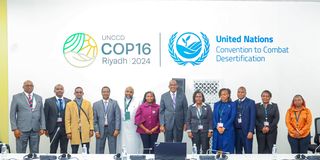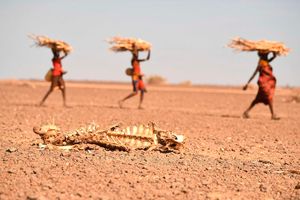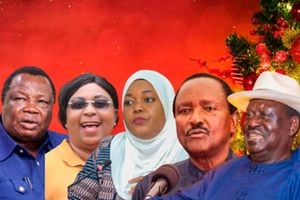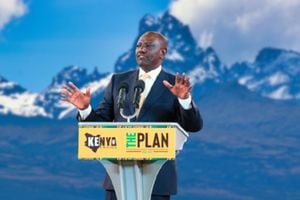Kenya pushes for new protocol to tackle drought

Environment, Climate Change and Forestry CS Aden Duale (middle) with the Kenyan team representing the country at the ongoing world's biggest land conference (UNCCD COP16) in Riyadh, Saudi Arabia.
What you need to know:
- UN finds that Africa loses over ‘100 football pitches’ of healthy land every minute.
In Riyadh, Saudi Arabia
Kenya wants member states that are part of the United Nations Convention to Combat Desertification (UNCCD) to urgently come up with a drought protocol that is comprehensive with new financial instruments.
The protocol, Kenya says, will help deal with drought, desertification and land degradation issues that Africa is grappling with.
This is after new UN estimates released by UNCCD showed that Africa is losing over 100 football pitches of healthy land every minute, threatening livelihoods, food, water security, and public health, with potential to disrupt regional economies and global trade.
UNCCD noted that up to 40 per cent of the world’s land is degraded, affecting over 3.2 billion people, with the highest costs borne by those who can least afford it - indigenous communities, rural households, smallholder farmers, and especially youth and women.
“Africa faces the largest financing gap, needing $191 billion annually to restore 600 million hectares of degraded land. This reflects not only significant challenges but also the continent’s unmatched land restoration ambition—the highest globally,”climate experts at UNCCD noted.
The situation, UNCCD said, is compounded by the sharp rise in droughts—up by 29 per cent since 2000—with projections showing that by 2050, three in four people worldwide could be affected.
Yet, despite this escalating crisis, global investments needed to meet the world’s land restoration and drought resilience goals are falling short by $278 billion each year.
This is why while addressing delegates drawn from all over the world attending the sixteenth session of the Conference of the Parties (COP16) meeting in Riyadh, Saudi Arabia, Environment, Climate Change and Forestry CS Aden Duale called for more funds that will enable local communities to use technology, innovation and science to combat desertification.
“Drought and land degradation issues that Kenya and many other global south countries grapple with year in year out require new financial instruments for a productive drought management approach.
“This dialogue guides us to share insights for strengthening drought management and resilience by exploring financial mechanisms and strategies that can contribute to driving successful and sustainable drought management and resilience,” CS Duale told the world.
Citing the Intergovernmental Working Group (IWG) report on drought by the UN, Mr Duale called upon member states to diligently negotiate and wisely adopt a comprehensive policy option that comprises avenues for unlocking financial mechanisms for effectively addressing drought challenges.
This, Kenya believes, will facilitate making history in the life of UNCCD by sustainably promoting drought management and resilience.
“While now we have the motivation and goodwill to drive drought management and increase drought resilience, unlocking public and private finance for land restoration and drought resilience is critical for the success of increasing drought resilience and land restoration,”CS Duale urged.
The CS pointed out that despite several financing mechanisms and avenues existing for facilitating transformative drought management and increasing drought resilience, drought funding is still limited compared to other environmental issues, suggesting the need for fully unlocking drought financing.
According to Kenya, to unlock drought funding, starting with public resources, state parties need to align drought plans with global, regional and government development agendas for easing mainstreaming drought programmes to costed national and subnational strategic plans and annual work plans.
Kenya is of the view that from a private sector perspective, strengthening partnerships between national public institutions and the private sector in implementing national programmes aligned to drought is critical.
“The involvement of private sector players in developing national development agendas is essential for private sector ownership, commitment, and unlocking private sector resources for supporting drought management and resilience programmes.
“Also, multilateral and bilateral funding agencies such as the Global Environment Facility and Green Climate Fund, including other development partners, play a fundamental role in driving environmental projects with drought dimensions,” Mr Duale told delegates in Riyadh while further pointing out that these funding sources have their traditional funding areas.
However, Kenya is also of the view that funding resources need regular reviews in their programming directions to accommodate emerging issues and prioritise emerging drought issues that require management to increase resilience.
“I call upon those of us coming from the public sector to consider mainstreaming drought in national development agendas, strengthening working relationships with the private sector and multilateral funding to review programming directions towards drought if we are to unlock public and private finance for drought resilience and even land restoration.
While agreeing with CS Duale, Ibrahim Thiaw, executive secretary of the UNCCD, said: "To protect lives and livelihoods, we must significantly increase investments in land restoration. The returns—both financial and societal—are undeniable. Every dollar invested in healthy land is a dollar invested in biodiversity, climate, and food security.
The good news is that the world could save billions annually and earn trillions more by restoring land back to health and building resilience to drought”.
In an exclusive interview, Dr Charles Lande, the deputy director for Environmental Planning and Research Coordination at the National Environmental Monitoring Authority, who’s the operational focal point at COP16 in Riyadh on behalf of the country and thereby Africa - as Kenya’s position is Africa’s position by virtue of Kenya currently being at the helm of Africa Negotiators Group- told Nation they are very alert on what the draft text of the ongoing negotiations should look like.
He added that they expect a smooth process unlike what happened at COP29 in Baku about two weeks ago, where negotiations stretched past the deadline for two days.
“We are alert. We want very strong, clear, concise and accurate language in the text,” he said while reminding that in her position paper, Kenya said that all COP16 negotiations should end by December 12, 2024 before the concluding plenary scheduled for December 13.
“Since December 2, we have been in Riyadh because drought is a global event that happens due to many natural and anthropogenic factors.
“Between 2020-2022, Kenya suffered one of the worst droughts in 40 years. In COP15 that was held in Abidjan, Parties under UNCCD agreed to establish an intergovernmental working group to form a report for two years that is now going to formulate policy positions for effectively addressing drought,” Kenya’s COP16 focal point explained, noting that he was a member of the team and one of three representatives from Africa that developed the report.
“And now in Riyadh, there is a draft decision going to be considered for effectively addressing drought across the world, that is why we are here and that is what we will be negotiating throughout COP16,” Dr Lande told Nation.
The draft decision fronts seven steps to sort out drought.
“Africa is rooting for a drought protocol, which is also the Kenyan position because this is one of the most comprehensive and proactive policy options that will address drought across the world. We are more seriously concerned because we are among the most affected in the world," he said, adding that if and when the protocol on drought becomes a reality, Kenya will see a flow of financial resources that will help the country realise the targets it has set.
Kenya further calls for the establishment of a Global Drought Fund(GDF) to focus on supporting drought, monitoring, technological deployment for increasing community resilience, management and awareness promotion.
Dr Lande also told Nation that the country further calls for increasing support to drought-related research and mitigation capacity building and awareness promotion.





